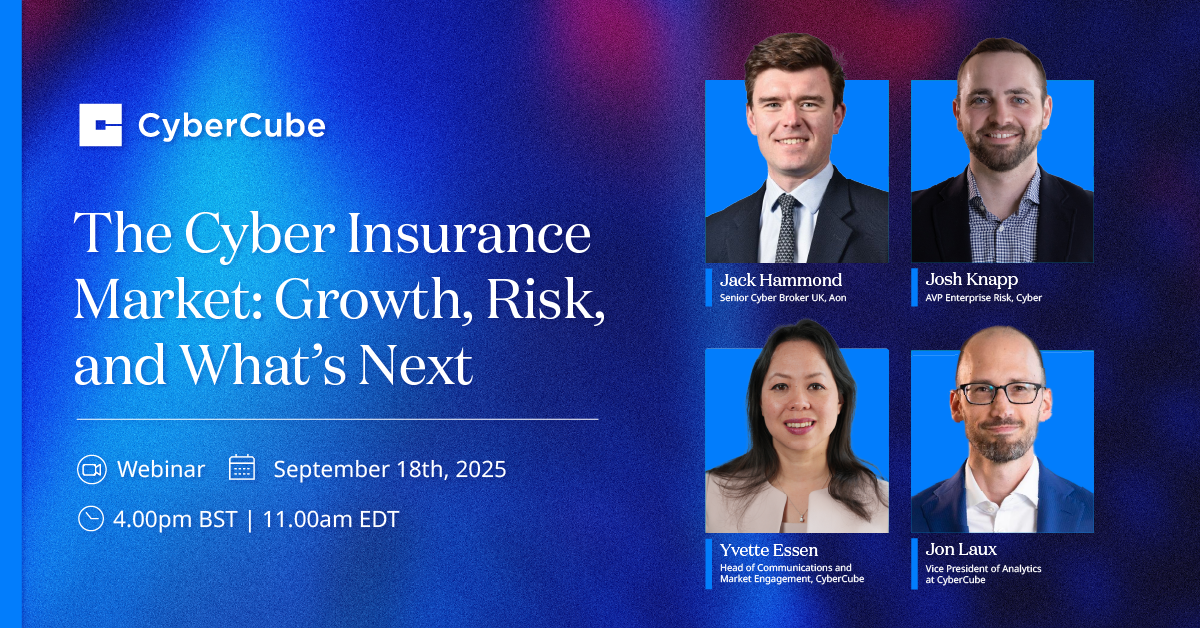Video transcript
Artificial intelligence is certainly one of the hottest topics in the cyber insurance market right now. I'm Yvette Essen, Head of Content, Communications, and Creative at CyberCube. Joining me to talk about AI and its implications for the cyber insurance market is Ashwin Kashyap. Ashwin is the Co-Founder of CyberCube and Chief Product Officer.
Yvette Essen:
"Ashwin, can we talk generally about AI? Why is it of particular importance to the cyber insurance market?"
Ashwin Kashyap:
"AI is truly transformational to the world at large and impacts all industry verticals, including insurance. In our opinion, it is as significant as the cloud, the mobile phone, and other transformational technologies we’ve seen over the past several decades. As a result, we need to pay close attention to what AI means for the cyber insurance market.
From CyberCube’s perspective, we firmly believe that the ubiquity of AI is not a question of 'if,' but 'when.' When that becomes reality, you should expect a regime change in terms of what the cyber threat landscape would look like. We are currently modeling that as part of how we think about emerging risks within the company.
In terms of AI's impact on cyber risk, based on some of the research we’ve done, a few things could lead to an increase in the frequency of cyber attacks. First, data leakage driven by employee use of AI technologies. When employees upload confidential information into these AI tools, the tools use those data sets to train the model and improve it. This confidential data could accidentally be leaked to other users of the same platform. That’s an important vector to watch out for, and it could increase the number of privacy breaches over time.
Second, there’s an increase in the ability to spoof using voice, video, email, chat, and other media. We’ve already seen empirical evidence of AI-generated voice scams that have resulted in financial fraud. This makes it easier for threat actors to conduct phishing campaigns and similar activities at scale, without relying on human capacity, which in turn leads to an increase in frequency.
Third, we are also concerned about misinformation and the loss of integrity of information at large. When you think about how software is developed, most programmers use packages and libraries to write code. It’s relatively easy to inject malware into one of these packages if you’re copying and pasting code from AI technologies. All of these factors lead to an expected increase in frequency over time, and the insurance industry needs to watch this very carefully."
Yvette Essen:
"Given those potential implications you just outlined, what are we doing at CyberCube to incorporate AI into our thinking?"
Ashwin Kashyap:
"We are thinking about AI from several different standpoints. From a modeling perspective, we are keeping a close eye on AI adoption, particularly from a business application standpoint. We are also exploring ways to incorporate AI into our modeling framework, which would help the insurance industry understand the marginal impact of a world where AI is ubiquitous. In addition to that, we are monitoring AI infrastructure companies, such as OpenAI and others, that are developing the underlying infrastructure that will enable AI to become widespread in business applications."
Yvette Essen:
"Ashwin, you used a great word—'ubiquitous.' Given that the world is increasingly going to be driven by AI, what can cyber insurers do to prepare themselves?"
Ashwin Kashyap:
"Let’s start with the fundamentals of the insurance business, which begin with the insurance policy. Now is the right time to start thinking about policy wording and language concerning AI as a topic. At CyberCube, we believe that risk tolerance should determine whether insurers exclude risks posed by AI or include them. We want to partner with the industry to help price and manage this risk as it becomes increasingly consequential."
Yvette Essen:
"Great. Thank you very much for explaining that, Ashwin."
At CyberCube, we frequently discuss the latest topics in the market. We publish a variety of thought leadership content, including research, blogs, and videos. All of this content can be found on our website at www.cybcube.com.
For CyberCube, I'm Yvette Essen.


.png)
.png)